Ducks are such fascinating creatures. A majority of this type of waterfowl can both swim and fly, and to complete the package they also have impressive navigation skills. That might bet the question on how much they rely on their eyesight for navigation. How good their eyesight is – and whether or not they’re colorblind like most animals.
Ducks are not colorblind. In fact, because of their impressive retinal structure, ducks can see a certain spectrum of colors more vividly than humans. This is especially true in the daytime when the added lighting gives ducks impressively sharp visuals.
However, there is a caveat to this vivid daytime vision. Ducks cannot see well at night. In this article, we’ll talk about everything there is to know about a duck’s eyesight, ranging from whether they can see underwater to whether they can recognize our faces.
How Good is a Duck’s Eyesight?
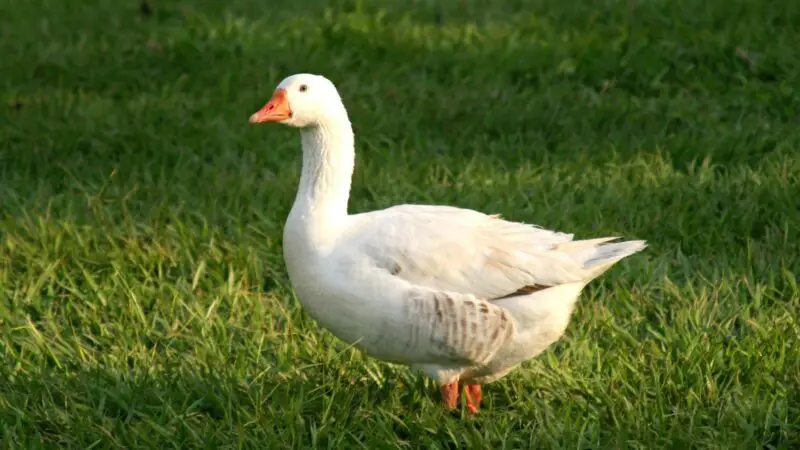
In general, ducks have great eyesight. Ducks have an incredible sense of sight, especially during the daytime. This is owing to their impressive eye structure – including the muscles that surround each eye.
Compared to humans, ducks have more cones in their eyes, and that allows them to see more colors than we do. This special eye structure allows them to see ultraviolet or UV, giving them what is known as 4-dimensional vision. As a result, they can see colors vividly and are extremely sensitive to light, which helps them escape from potential predators.
Aside from the myriad of visible colors, ducks can also see better than humans in terms of distance. In fact, they can see two to three times farther than we can – and with such formidable sharpness. This is owing to the duck’s eye muscles that are capable of adjusting both the lens and the cornea.
As a result of these traits, ducks can detect movement from a notable distance and escape possible danger. Now that’s something we all wish we had.
What Colors Do Ducks Cannot See?
Ducks can see all colors, albeit some more vividly than others. Experts reveal that because of the impressive number of cones in their eyes, birds can even see more colors than humans. Thus, we don’t think that there are colors that ducks cannot see.
With that said, don’t expect ducks to see things the way we do. Colors like green, blue, red, and yellow are especially vivid, and that makes some objects pop out more than others.
Also, colors that are not within this spectrum may have a more obscure shape or may look overpowered by other colors. Nevertheless, that doesn’t mean that ducks can’t see these colors.
Can Ducks See Pink?
Ducks can see pink. It must be noted that pink falls within, or is close to, the red spectrum. While the color may not be as bright and vivid as red, there’s no doubt that ducks can see pink.
What Are Ducks’ Favorite Color?
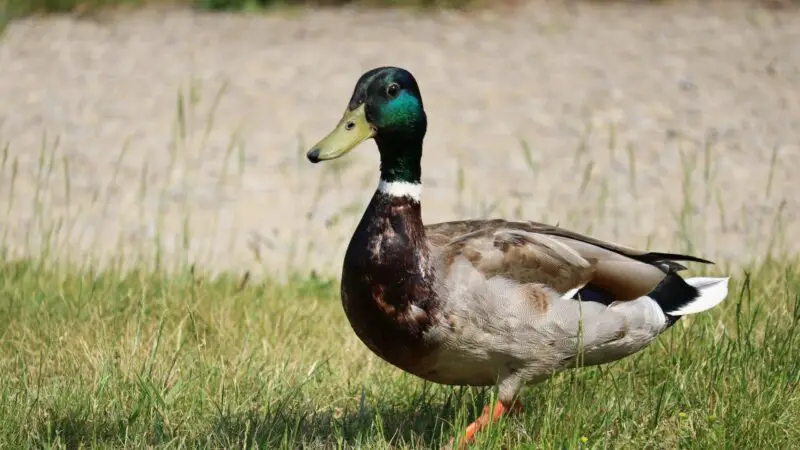
Green seems to be a duck’s favorite color. Several studies show that ducks tend to be drawn to the color green, as well as colors that fall close to that spectrum, such as yellow-green and blue-green. This seems to be the case for most duck species, regardless of age.
In fact, a study conducted on chicks and ducklings revealed that 1-day-old Pekin ducklings show a preference for objects with green or yellowish-green colors. This tells us that if we want ducks to be more drawn to us or certain food, then going green is the way to go.
Can Ducks See in The Dark?
Ducks cannot see well in the dark. As stellar as their daytime vision may be, ducks do not have the best vision once the sun has set.
Studies reveal that ducks have more cones in their eyes than humans, and that gives them better vision in lighted areas. While they have an abundance of cones, their eyes do not have as many rods, and that leads them to have poor eyesight once it gets dark.
You see, rods are the photoreceptors responsible for low-light areas. So with a lack of these low-light photoreceptors, ducks tend to struggle with seeing in the dark.
Nevertheless, ducks are not completely blind in the dark. They can still see, although the surroundings are not as vivid as when there’s a lot of light around. Luckily, they have sensitive bills that help them survive when it gets dark.
Can Ducks See Underwater?
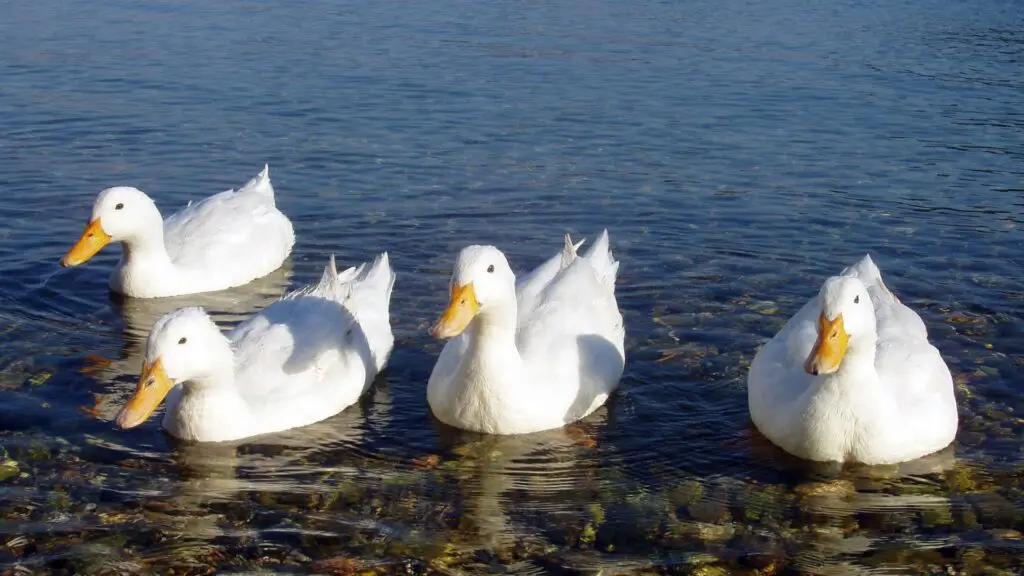
A majority of duck species have no problem with seeing underwater.
Anatomically speaking, ducks have a third eyelid that protects their eyes whenever they go for a dive. Unlike our eyelids that prevent us from seeing once we close our eyes, this third eyelid allows ducks to see even when it’s closed.
Additionally, a study revealed that some duck species can even constrict their pupils whenever they go for a swim. This not only prevents water from getting inside their eyes but also helps them navigate the waters with ease.
Can Ducks See Forward?
It’s interesting to note that while ducks have eyes on their sides, they can still see what’s ahead of them – even from a notable distance. This goes to show that ducks are among the species of birds with the best eyesight.
What Does a Duck’s Vision Look Like?
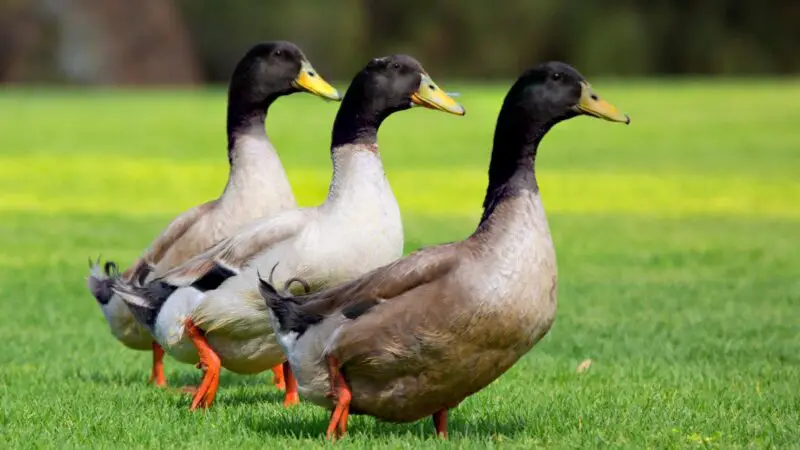
A duck’s vision is both vivid and panoramic. With all this talk about how amazing a duck’s eyesight can be, we are all curious as to what a duck’s vision might look like.
To give you an idea, the positioning of each eye gives a duck a panoramic view of its surroundings. In the daytime, they have a clear view of what’s around them, allowing them to detect even the slightest of motions, that’s how clear their vision is.
Also, we have to factor in that some colors are more vivid while others will look more muted. Both these factors paint us a picture that ducks can see a wide view of the world with impressive clarity and a lot of colors.
Do Ducks Have 360 Vision?
Most duck species have 360-degree vision. Again owing to the side-positioning of their eyes, most ducks enjoy an all-around view of their surroundings.
A study has revealed that the mallard duck, which is the ancestor of most domestic ducks, has a 360-degree horizontal visual coverage. As for the rest of the duck species, they enjoy an almost 360-degree vision at around 340 degrees.
Thanks to this impressive feature, ducks can easily determine when a predator is nearby and escape accordingly.
Can Ducks Recognize Human Faces?
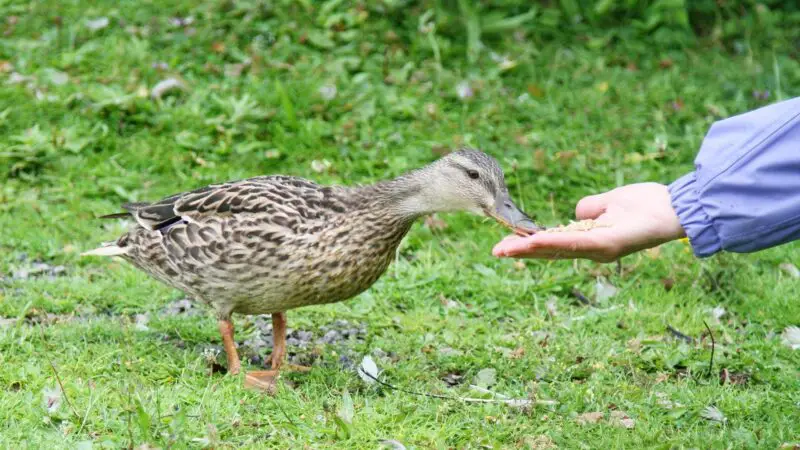
You’d be surprised to know that ducks can recognize human faces. And to some extent, some can even recognize voices and commands. This is great news for people who have been raising ducks as pets.
What Causes Blindness in Ducks?
Injury, vitamin deficiency, and age are some of the factors that cause blindness in ducks. Ducks can go blind if their eye has been pecked by another duck or bird, or if it has been infected by a bacteria.
In other instances, ducks can also go blind because of old age, especially if they are genetically prone to developing cataracts. There are also cases of ducks going blind because of fungal infections and vitamin deficiencies.
Overall, make sure that your ducks are always healthy and safe to keep them from going blind.
Frequently Asked Questions
What Type of Vision Do Ducks Have?
Ducks have what is called monocular vision. This means that each eye is used to view its surroundings separately, owing to being positioned on opposing sides of a duck’s head. This is in contrast to binocular vision, which means both eyes are used to look at the same surroundings simultaneously.
Do Ducks Have Memories?
One of the most interesting things you’ll learn about ducks is that they have memories. While ducks do not have short-term memories, they are capable of remembering details if it means improving their chance of survival.
Thus, if you have been nice to a duck, they will remember you for being nice to them. Inversely, ducks will always remember to avoid predators. That’s how they use their memories to survive.
Summary
Although limited, ducks can see a variety of colors to help them successfully navigate and find food. While their vision is not as sharp once it grows dark, this does not discount the fact that they have amazing visual capabilities. And the fact that they can recognize faces also makes them quite the unique species.
List of Sources
Molecular Basis of Tactile Specialization in the Duck Bill
Total Panoramic Vision in the Mallard Duck, Anas Platyrhynchos
